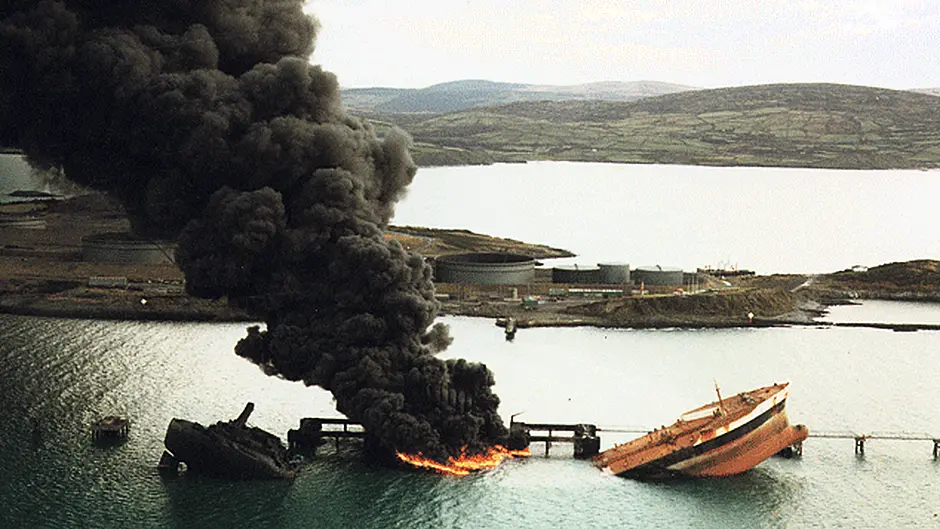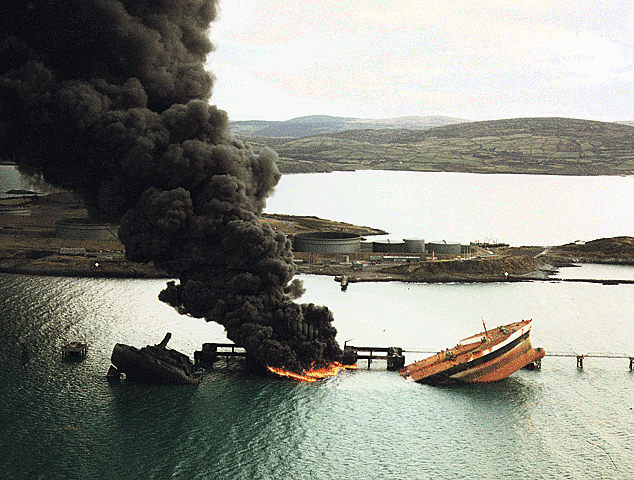Fifty men died in the Betelgeuese fire on Whiddy Island, thirty-six years ago this January. Brian Moore spoke to the last surviving member of that oil terminal crew
A TOWER of flame and smoke reached hundreds of feet into the night.
The sound was not unlike a thousand storms rolling down through Bantry Bay and clashing like a rushing wave against the sleeping town.
A farmer in Ahakista on the southside of the Sheep’s Head peninsula, fearing he had left a light on outside his house, was shocked to discover the entire night sky lit up. He watched as the flames from the MV Betelgeuse burned, engulfing not only the huge vessel at anchor at the oil terminal on Whiddy Island, but possibly the jetty and the storage tanks.
Frantic telephone calls from the island called on the emergency services in Bantry and beyond for urgent help.
Then the first explosion ripped the night sky.
‘I felt it more than heard it, there was a flash and then, for a fraction of a second, I remember a force that seemed to push and lift me at the same time. I don’t think I was knocked over…but I do remember the heat, like a wall, solid and inescapable,’ says Brian McGee, the last surviving oil terminal crew member.
Earlier that Sunday evening, January 7 1979, Brian and his shift mates, many of whom would not return from the island that night, had waited at Bantry Pier for the little ferryboat that would transfer them across the bay to Whiddy.
‘It was a cold night. Our shift was to begin at 8pm and to run until 8am the following morning. There was nothing special about the night, the bay was calm and there was a lot of the usual chat and banter on the pier before we boarded the ferry.’
While Brian and his fellow Gulf Oil colleagues prepared for their night’s work, the crew of the MV Betelgeuse were busy discharging the ship’s load of crude oil. As the shift changed and the next lot of men began to settle in to their night’s work, the ship was steadily pumping the oil to the waiting storage tanks on Whiddy Island.
The huge tanker, all 61,700 tonnes, had originally been destined for the port of Sines, south of Lisbon in Portugal. However, due to severe weather, the Betelgeuse could not enter the harbour and the ship was rerouted further north to Leixoes near Porto.
Fate took another cruel twist when another ship, which had sunk a few days before, was now blocking the mouth of the harbour at Leixoes and the heavy, slow and long Betelgeuse could not get in.
With the weather worsening all the time, the fateful decision was taken and the Betelgeuse was ordered to make for Bantry Bay.
The tanker, loaded with over 115,000 metric tonnes of oil, passed into the bay early on January 4 and made its way very slowly to the waiting jetty and the 12 huge storage tanks on Whiddy Island where it completed berthing at 8pm on Saturday January 6.
‘As we crossed over to the island that night there was the usual talk and jokes. Some of the lads started, as they always did, a card game as the ferry chugged its way across the bay. As we disembarked, we were greeted by the lads who were just finished their shift and were getting ready to head back to Bantry. We completed our shift change over and there wasn’t anything out of the ordinary to report. We reported to our stations and began the routine schedule, just like we always did.’
Donegal native Brian, now 68, had 10 years’ experience with Gulf Oil at the time, having started work with the company back in 1968. As an assistant ‘pump man’ he was responsible for monitoring the crude oil as it was pumped from the ship to the tanks.
Of the 12 massive oil tanks on the island, five were full, with over 80,000 tonnes of oil in each one. These five full tanks were in line and facing the Betelgeuse when a fire broke out on board the ship.
‘Everything was running smoothly as far as we could see, then we got a call that there was a fire on the ship. We immediately went as fast as we could to check the fire pumps and at that time it looked like a small fire. We didn’t think it was a major problem; everything, the pumps and so on, were working well, so we returned to the control room. We were one third of a mile away from the fire, we could see it, there phone calls coming in fast from the jetty crew and it was then that we started to see the flames getting bigger and bigger.’
For Brian and the crew in the control room, everything still seemed to be working as per procedure, until suddenly – in less than a second – the flames reached out from the ship and engulfed the jetty.
‘I can still see it to this day. I saw the crew on the jetty running, trying to escape the flames that seemed to reach out from the ship and devour the jetty and everyone on it. I never saw those men again.’
There followed a series of explosions, each one ripping at the ship, sending pieces of the hull and other equipment raining down on the island.
‘One piece which weighed over half a tonne was found only feet from Tank No 1, which is over half a mile from the ship. We spent the night, shutting off pumps and hoping that we could contain the huge fire and stop it spreading to the tanks. I can’t even imagine what would have happened if the tanks on the island had exploded.’
As the scale of the disaster emerged, emergency services from across Cork began to arrive. With the flames, smoke and dangerous gas from the explosion hampering the rescue efforts, Brian and his workmates continued to monitor the storage tanks, hoping that a further disaster could be averted.
‘There were times that night when I thought, “this is it, I’m not getting off this island alive”. The heat was incredible, the sea was on fire. And all the time we were expecting more explosions.’
When Brian left the island the next morning at 10am, he remembers looking back at the pillar of smoke still rising. There were 50 people dead – all 42 crew of the Betelgeuse, and the seven local men who were on the jetty. As Brian looked around at the empty seats on the ferry, heading slowly and quietly back to Bantry, his life was changed forever.
‘That night changed me, I was not the same person who said goodbye to my wife the night before and for years I suffered with nightmares and depression. Whiddy had taken control of my life and would not release me.’
In an effort to find peace and to put an end to his experiences, Brian has written and self-published a book which tells his story, not only of the disaster but how it affected his life, and the lives of his family and friends.
‘I endured many years of mental hell and a constant feeling of anguish and depression. I came close to suicide on a number of occasions. I think writing the book has, I hope, put a final line under that night. While I’ll never be able to forget, I think this will help me finally come to terms with the experience,’ Brian said.
Brian’s book, ‘Living with the Whiddy Disaster’ is available in newsagents and bookshops throughout West Cork.










